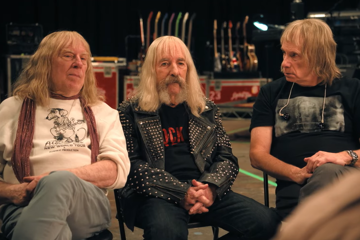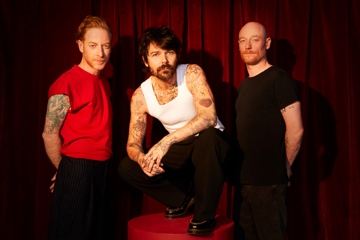Can't Wait To Hear 'Smash' At Good Things? The Offspring's Noodles Shares The Making Of
Almost 25 years ago, Epitaph Records released what would become the best-selling independent album of all time. Lauren Baxter travels back to 1994 with Kevin "Noodles" Wasserman to find out how The Offspring made 'Smash'.

“It's been a long time, I'll do my best to remember.”
The year was 1994 and according to lead guitarist Kevin "Noodles" Wasserman, The Offspring were “just trying to figure out what we were gonna do with our lives and how long we could make this punk rock thing happen”.
“We never really thought we'd make a living doing it," he remembers of the time. "It was just what we loved doing for fun... It was something you might get away with for a few years but it certainly wasn't going to be a career. But we didn't care, we still loved doing what we were doing. We loved touring on weekends and summer vacations and playing the odd local gig during the week so we thought, 'Let's make another record.'”
That record was Smash and as time would come to tell, it was the record that changed everything for the band. Now as it approaches its 25th anniversary, the iconic ‘90s outfit are heading Down Under to play it in its entirety. Here we go track by track with Noodles to find out why "you gotta keep ‘em separated".
Time To Relax
“John Mayer [not that one] is a voice-over artist and we wanted to get somebody to give commentary in between songs and so we hired him to come in and do a lot of this intro and you know just kind of cheesy, like introducing lounge acts in between the songs. It was really humorous to us and got people to hopefully pay attention that another song was coming.”
Nitro (Youth Energy)
“You know which is really the intro to the record. We wanted something that started off with a drum roll and then just straight into heavy guitar, bass and drums, uptempo, punk rock sounding stuff. The little riff in the intro is real simple. Almost like a Chuck Berry double stop on speed kind of thing. But also something we thought the kids would sing along to. It's pretty simple, pretty straightforward structure-wise. It's one of the rotating songs that we call the ‘deep cut rotation songs’ and we'll mix in it and throw it in for the older fans that love Smash.”
Bad Habit
“Bad Habit's just a fun one right? Really kinda about a guy... You know, freeway shootings were a big deal back then, in like the early '90s, and most of them were indiscriminate - people just shooting from car to car when they went into a road rage. They didn't call it road rage so much yet, it was really just shooting, random shootings on the LA freeway. And Dexter was a very slow driver and he would get in the fast lane and he would either be writing songs or going over his school homework and forget about how fast he was going or how slow he was going really. So people would be ripping around him all pissed off. And I'm the guy who'd be getting pissed off. I'm the guy who drove like a maniac, screaming and yelling at all the slow morons in the fast lane so...”
Gotta Get Away
“Gotta Get Away was probably, I guess, one of the slower ones on the record, little bit more of a rock beat, but those drums definitely sound reminiscent of TSOL, who were a band we were big fans of. We kind of got the inspiration from them. I don't think there's any secret there for anyone who knows both bands. But the main riff of that song actually came from an older song that we had done called Cogs that we did in the mid-late '80s; one of the earliest tracks we had ever done. It was really fast and kind of choppy, the first song Cogs was, and it didn't really have any flow or anything and so once we kind of came up with that drum beat and then worked the main riff into the chorus structure, it went a lot more smoothly.”
Genocide
“Dexter started experimenting with different tuning so we actually changed the tuning on the guitar there a little bit so we could do some open drone notes. It's a real simple chord structure for the most part. Starts off with a three-chord kinda thing and then we add a few more chords later [laughs] but the way he kind of did the droning chords with C F G tuning of the bottom strings was interesting to me and fun. It's also got, well, certainly a heavy, angry meaning to it, but it's also got that sound I think as well.”
Something To Believe In
“That was one of the few songs that I don't think we played when Smash came out, we never really played that one. I don't know why. It wasn't one of the most popular. Smash being our third record, at the time we had to cut something. We were ready to play all these songs but that was one we hardly, until recently when we started doing Smash in its entirety for anniversary shows, we never really played that live. We had to all relearn how to play that one. It's a fun song, I love that song. I always did. But not one that ever got its due. It's kind of an odd song to be playing live and also I don't think people are as familiar with it. You know, from there we go straight into Come Out And Play and everyone loves that one.”
Come Out And Play
“When I first heard [the ‘keep ‘em separated’ part] for sure, I knew it was Blackball doing it. That's our friend Jason McLean. We call him Blackball because he was just a fan, he would come to shows and scream at us to play Blackball off our first record [laughs]. He was a one-hit wonder every time he'd show up to the show, that's all we could hear, so we started calling him Blackball; a lot of his friends still call him Blackball too. But Dexter was writing that one and that one changed - I didn't hear that line until we were in the studio. The structure of the song we had together, the Middle Eastern riff, and I thought that was all really cool. Then I heard the tagline ‘You gotta keep 'em separated’ and I thought, ‘Oh man.’ I thought it was funny, I didn't think it was going to be the hit that it was. Of course that's the first radio hit we ever had, ever. The first one off this record, the first one we ever had. It just took off like crazy, no one saw it coming.”
Self Esteem
“Self Esteem was the second single off the record and also did well, at that point we were definitely like, ‘Wow, how crazy's that!’ Gotta Get Away was the third single off that and that was really it for that record but that's not bad! Three singles off one record for a punk band coming from where we came from [laughs]. Not too bad. Self Esteem seems to have a little bit more longevity, it was a little bit more of a sleeper hit than Come Out And Play. Come Out And Play comes out and grabs people right away I think, whereas Self Esteem just kind of grew on people over a longer period. So that's why we always end with Self Esteem and it really gets the crowd going every night.
“I wasn't a big fan of the song when we were first doing it, I think because of the tempo and to me, it just seemed kind of, well, you know when you are rehearsing it just as a band instrumentally, you don't really hear everything. Once we got in the studio, it really started to come together. We started off with the intro instead of doing the ‘blah blah blah blah’ it was just an acoustic, playing the guitar really, and that was too reminiscent of Nirvana's Smells Like Teen Spirit really and so we thought, ‘What can we do?’ and Dexter was like, ‘What if we just did this?’ and we all went in and did the gang vocal on that and then I thought, ‘Ok, that’s got something that makes people listen right away.’ To me, again, super funny and kinda nonsensical. The whole song is pretty tongue-in-cheek but also relatable. I've had these big muscle-bound dudes up front with their arms laying over the barricade singing along that they're just a sucker with no self-esteem [laughs]. That always kind of cracks me up.”
It'll Be A Long Time
“I don't remember much about this song. This is another one that we'll throw in from time to time, in that rotating deep cuts slot. I love this song, it's a great song. One of the barn burners that's definitely more uptempo and in your face. More aggressive. I think it's a great song, plenty to sing along to. Still got plenty of melody I think.”
Killboy Powerhead
“We had a friend who hipped us to The Didjits and we dug it and we were looking at this record and going, ‘Ahh maybe it needs something... Maybe it's a little light as far as songs.’ We had really 12 songs if you don't count Time To Relax as a song, so we wanted to add one more and we just decided to do it. It's a fun riff, we never even asked the guys if we could do it [laughs]. We never asked The Didjits, Rick is the guy who wrote the song, Rick Sims, it's his band. He's been in a bunch of other bands; great singer and performer and songwriter. So when we finally met him, he just came in and was kinda just really just amused at the whole situation. He's got a very wry sense of humour, really nice guy. I'm glad we didn't ask him and he said no and [laughs] I think he's probably glad we didn't ask him and he said no too.”
What Happened To You?
“We always called it the ska song and really that was inspired by our friends in Operation Ivy and Rancid, who later we toured with. And I guess also there was a lot of bands doing the ska kind of thing. Voodoo Glow Skulls as well back in the day, we played with them a bunch. And going back further we loved The Specials and stuff like that. There was always ska happening in the punk scene. I think for a band to do just ska can maybe, it's such a defined style of music that it can really kind of... It can become monotonous sounding if that's all you’re playing, but I think to throw a song in here or there can really add flavour. We all felt that way.”
So Alone
“So Alone was just a quick one that we wrote. There's not really much to the song, it was really just kind of like a venting of aggression. Very punk, in your face for sure.”
Not The One
“Not The One was kind of a little trippy. We started working with some effects for the first time. We don't use a lot of guitar effects to lay and things like that and Dexter had this idea for this riff that was really kind of drenched in delay that drove the song and then he also had the idea for the lyrics on that one about you know, ‘Hey [laughs] don't blame us! Let's blame the generation before us for fucking up the world.’ God, poor kids today, they've really got it - the world's way more fucked up. It's kind of ironic, ‘We're not the one, don't blame us,’ but at the same time, if we're not helping to make it better we're part of the problem still.”
Smash
“Smash was just the one to kind of tie it all in. I always think of Smash as straightforward, vintage Offspring sound. You know, uptempo, something you can sing along to, little bit of guitar riff in there along with the heavy bar chords and palm-muted driving guitar bass and drums. I think it was one of the last ones written for the record and we were kind of getting an idea of how to tie this all together. We wanted something that, we didn't want - like the next record we went with, Ixnay On The Hombre [laughs] - long, not easy to say. With this record we just wanted one word, that kind of just, ‘Argh!’ you know. One word that sounded like ‘argh’ and Smash was it.”







